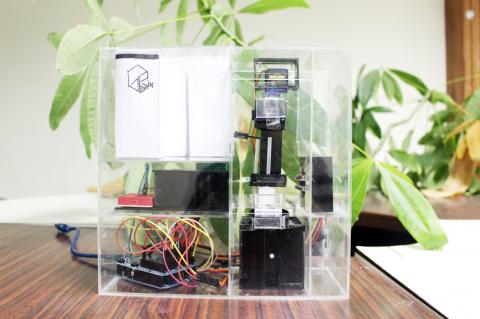A multidisciplinary team from Chiayi County’s National Chung Cheng University (CCU) won a silver medal for developing the Carindex — a device that detects tooth decay — at the International Genetically Engineered Machine (iGEM) Competition hosted by the Massachusetts Institute of Technology (MIT) last week.
The CCU Taiwan team was awarded a silver medal based on criteria that included validity, collaboration and human practices, according to iGEM’s Web site.
The judges also nominated the team — out of 310 participating teams — for a best entrepreneurship award.

Photo: Tseng Nai-chiang, Taipei Times
Elementary-school students in Taiwan visit the hospital every six months for an oral exam subsidized by the Ministry of Health and Welfare, but these six months can be a window for tooth decay, CCU team student leader Iris Chen (陳詩詠) said.
Inspired by this situation, 16 students from nine departments joined under the leadership of CCU Department of Biomedical Sciences associate professor Lee Cheng-i (李政怡) to develop an instrument to detect tooth decay at home, Chen said.
“Users of the Carindex dental caries-detecting device provide a saliva sample and wait for data to be generated from the interaction between their saliva and a special litmus paper. An hour and a half after the data are uploaded to the cloud, [users] can use a mobile app to find out their risk of developing cavities. Data from previous evaluations can be used to form a trend graph. [Carindex] can determine a risk level and remind users to go to the hospital for a checkup,” team member Eric Huang (黃裕軒) said.
The iGEM Competition is an international competition for students in the field of synthetic biology. The competition requires students to develop products that solve everyday problems.

Chinese Nationalist Party (KMT) Chairman Eric Chu (朱立倫), spokeswoman Yang Chih-yu (楊智伃) and Legislator Hsieh Lung-chieh (謝龍介) would be summoned by police for questioning for leading an illegal assembly on Thursday evening last week, Minister of the Interior Liu Shyh-fang (劉世芳) said today. The three KMT officials led an assembly outside the Taipei City Prosecutors’ Office, a restricted area where public assembly is not allowed, protesting the questioning of several KMT staff and searches of KMT headquarters and offices in a recall petition forgery case. Chu, Yang and Hsieh are all suspected of contravening the Assembly and Parade Act (集會遊行法) by holding

PRAISE: Japanese visitor Takashi Kubota said the Taiwanese temple architecture images showcased in the AI Art Gallery were the most impressive displays he saw Taiwan does not have an official pavilion at the World Expo in Osaka, Japan, because of its diplomatic predicament, but the government-backed Tech World pavilion is drawing interest with its unique recreations of works by Taiwanese artists. The pavilion features an artificial intelligence (AI)-based art gallery showcasing works of famous Taiwanese artists from the Japanese colonial period using innovative technologies. Among its main simulated displays are Eastern gouache paintings by Chen Chin (陳進), Lin Yu-shan (林玉山) and Kuo Hsueh-hu (郭雪湖), who were the three young Taiwanese painters selected for the East Asian Painting exhibition in 1927. Gouache is a water-based

Taiwan would welcome the return of Honduras as a diplomatic ally if its next president decides to make such a move, Minister of Foreign Affairs Lin Chia-lung (林佳龍) said yesterday. “Of course, we would welcome Honduras if they want to restore diplomatic ties with Taiwan after their elections,” Lin said at a meeting of the legislature’s Foreign Affairs and National Defense Committee, when asked to comment on statements made by two of the three Honduran presidential candidates during the presidential campaign in the Central American country. Taiwan is paying close attention to the region as a whole in the wake of a

OFF-TARGET: More than 30,000 participants were expected to take part in the Games next month, but only 6,550 foreign and 19,400 Taiwanese athletes have registered Taipei city councilors yesterday blasted the organizers of next month’s World Masters Games over sudden timetable and venue changes, which they said have caused thousands of participants to back out of the international sporting event, among other organizational issues. They also cited visa delays and political interference by China as reasons many foreign athletes are requesting refunds for the event, to be held from May 17 to 30. Jointly organized by the Taipei and New Taipei City governments, the games have been rocked by numerous controversies since preparations began in 2020. Taipei City Councilor Lin Yen-feng (林延鳳) said yesterday that new measures by